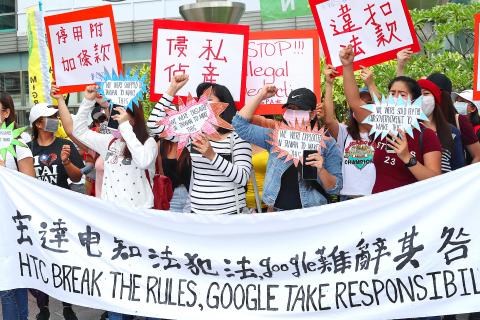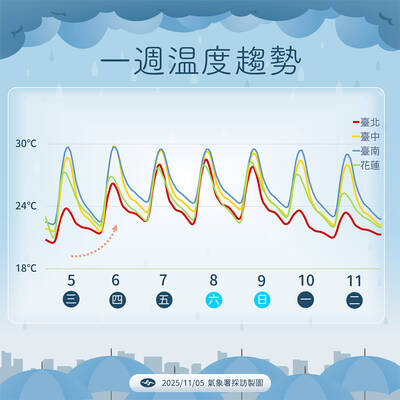A group of Filipino workers yesterday accused HTC Corp of illegally docking their pay using forged agreements.
About 50 migrant workers demonstrated outside Google’s office at Taipei 101, urging the US firm to require HTC to improve its labor conditions and meet its supplier code of conduct.
In February, HTC told its Filipino workers that they would all be fired because the company’s Pixel smartphone division has been divested to Google, said Wong Ying-dah (汪英達), director of the Service the People Association in Taoyuan.

Photo: CNA
Since then, the company has been asking the workers to sign an agreement to terminate their contracts, he said, adding that many signed as they believed they had no choice.
The company has also been illegally docking the workers’ pay based on an addendum to the contract that many workers said they never signed, he said.
“According to the addendum, each worker must pay NT$2,500 per month for their food and accommodation, and pay for their plane tickets,” he said, adding that this contradicts the original contract, which states that HTC would cover those expenses.
A Filipino worker, who identified herself only as Divine, said that the signature and fingerprint on the addendum has a signature in which her name is spelled incorrectly.
“This is not my fingerprint and my handwriting is not like that,” she said, pointing to a copy of the addendum with a signature that has her name spelled wrong.
“I will not mistake my own name. It is my name. I have been writing it for almost 25 years. I want to know who is responsible for this,” she said.
Many other workers also believe the signatures on their addendums were forged, she said.
Even if the signatures were genuine, according to the Ministry of Labor’s administrative order in 2013, if foreign workers sign an additional agreement that contradicts the original one, the one with the better labor conditions would apply, Wong said.
The company has also been charging migrant workers an additional “food service fee” that is deducted from their monthly paycheck, he said.
HTC said the fee covers their food expenses beyond their daily food allowance of NT$135 and purchases they make using their employee card at the convenience store inside the company, he said.
“The fee swings between several hundred New Taiwan dollars and more than NT$1,000 a month, and no one knows how they calculate it. After the incident was reported to the Taoyuan City Government’s Department of Labor, the department carried out a labor inspection and fined the company,” Wong said.
The workers demanded that the company provide free food and accommodation to migrant workers who agreed to terminate their contract to look for other jobs in Taiwan.
They also demanded that HTC return the food and accommodation fees and food service fees it deducted from their salaries.
Google’s supplier code of conduct states that it would help improve labor conditions at its suppliers by communicating with them, providing training and monitoring their progress, said Lee Shih-chang (李世昌), a representative of the Trade Union of Electrical, Electronic and Information Workers in Taiwan.
It also says that the supplier must follow local immigration and labor laws, he said, adding that HTC has a social responsibility to en sure migrant workers’ right are upheld.
HTC’s corporate responsibility report said that it would follow the law and that it aims to protect human rights and the environment while maintaining profitable, Lee said.
HTC said all of its operations are run in accordance with the law.
The company denied being in talks with any of its migrant workers about terminating their contracts.
The food and accommodation fees are deducted based on an addendum to the contract they signed, the company said.
If employees question the authenticity of the signature and fingerprint on the addendum, they could file a lawsuit to resolve the matter, it said.
Google has declined a request for comment.
Additional reporting by CNA

Three Taiwanese airlines have prohibited passengers from packing Bluetooth earbuds and their charger cases in checked luggage. EVA Air and Uni Air said that Bluetooth earbuds and charger cases are categorized as portable electronic devices, which should be switched off if they are placed in checked luggage based on international aviation safety regulations. They must not be in standby or sleep mode. However, as charging would continue when earbuds are placed in the charger cases, which would contravene international aviation regulations, their cases must be carried as hand luggage, they said. Tigerair Taiwan said that earbud charger cases are equipped

Foreign travelers entering Taiwan on a short layover via Taiwan Taoyuan International Airport are receiving NT$600 gift vouchers from yesterday, the Tourism Administration said, adding that it hopes the incentive would boost tourism consumption at the airport. The program, which allows travelers holding non-Taiwan passports who enter the country during a layover of up to 24 hours to claim a voucher, aims to promote attractions at the airport, the agency said in a statement on Friday. To participate, travelers must sign up on the campaign Web site, the agency said. They can then present their passport and boarding pass for their connecting international

UNILATERAL MOVES: Officials have raised concerns that Beijing could try to exert economic control over Kinmen in a key development plan next year The Civil Aviation Administration (CAA) yesterday said that China has so far failed to provide any information about a new airport expected to open next year that is less than 10km from a Taiwanese airport, raising flight safety concerns. Xiamen Xiangan International Airport is only about 3km at its closest point from the islands in Kinmen County — the scene of on-off fighting during the Cold War — and construction work can be seen and heard clearly from the Taiwan side. In a written statement sent to Reuters, the CAA said that airports close to each other need detailed advanced

UNKNOWN TRAJECTORY: The storm could move in four possible directions, with the fourth option considered the most threatening to Taiwan, meteorologist Lin De-en said A soon-to-be-formed tropical storm east of the Philippines could begin affecting Taiwan on Wednesday next week, the Central Weather Administration (CWA) said yesterday. The storm, to be named Fung-wong (鳳凰), is forecast to approach Taiwan on Tuesday next week and could begin affecting the weather in Taiwan on Wednesday, CWA forecaster Huang En-hung (黃恩鴻) said, adding that its impact might be amplified by the combined effect with the northeast monsoon. As of 2pm yesterday, the system’s center was 2,800km southeast of Oluanbi (鵝鑾鼻). It was moving northwest at 18kph. Meteorologist Lin De-en (林得恩) on Facebook yesterday wrote that the would-be storm is surrounded by